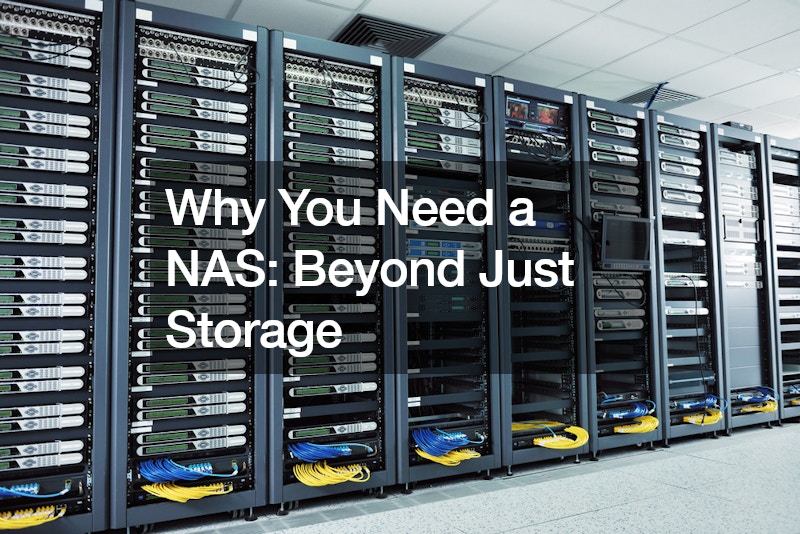In the era of ever-expanding digital footprints, our need for reliable and versatile storage solutions has grown exponentially. While external hard drives and cloud storage have been popular choices, Network Attached Storage (NAS) has emerged as a powerhouse offering more than just storage capabilities. In this article, we delve into the world of NAS and explore why it has become a crucial element for tech enthusiasts, professionals, and anyone seeking a robust data management solution.
Understanding NAS: More Than a Storage Unit
At its core, a NAS is essentially a computer connected to your network with dedicated hard drives. It acts as a centralized hub for data storage, accessible from anywhere globally.
What sets NAS apart is its ability to do more than just store data; it’s a versatile device that can automatically back up all computers and smartphones in your network, record security cameras, and host various services simultaneously.
The Limitations of Traditional Storage Solutions
External hard drives, though reliable for storing data, come with their own set of limitations. One significant drawback is their lack of proactive security measures. NAS, on the other hand, operates on a 24/7 basis, allowing for automated tests on hard drives. This ensures that potential issues are identified well in advance, minimizing the risk of data loss.
Redundancy and Flexibility in NAS
NAS introduces the concept of RAID (Redundant Array of Independent Disks) setups, providing redundancy in case of drive failures. This means that even if one or more drives fail simultaneously, your data remains intact. Moreover, expanding storage is a breeze with NAS – simply slot in a new drive, and you’re good to go. This flexibility is a significant advantage over traditional external drives, which may require a more cumbersome process for expansion.
Speed and Accessibility
One standout feature of NAS is its speed, especially in comparison to cloud storage providers. While cloud services may cap upload and download speeds, a Synology NAS, for instance, can saturate a full gigabit both up and down without breaking a sweat. This speed advantage becomes even more pronounced when dealing with large volumes of data, making NAS an attractive option for those who value efficiency.
Diverse Services in One Device
Beyond storage, NAS opens up a world of possibilities by hosting various services. Popular among these is the Plex Media Server, turning your NAS into a personal streaming hub akin to a private Netflix. Additionally, services like home automation, CRM systems, and lightweight applications can be seamlessly integrated into a NAS environment using Docker containers.
Learning Opportunities with NAS
Perhaps one of the most underrated benefits of adopting a NAS is the learning experience it offers. Whether you opt for an all-in-one solution from Synology or decide to build your own NAS using a Raspberry Pi, the journey involves delving into hardware and, more importantly, software aspects. Users are likely to gain knowledge in Linux, networking, and containerization technologies like Docker, contributing to a more comprehensive understanding of IT.
Privacy and Safety Measures
Privacy is a growing concern in the digital age, and NAS addresses this by offering control over your data. Unlike cloud providers, NAS allows users to employ snapshots and file versioning, enabling easy recovery to a previous state. Additionally, NAS users have the freedom to determine the duration for which backups are retained, a level of control often absent in cloud storage services.
Synology Cloud NAS Backup
For those who prioritize data security, a Synology NAS introduces an additional layer of protection through its cloud backup solutions. With the Synology Cloud NAS Backup, users can ensure that their critical data is not only stored locally but also securely backed up in the cloud.
The importance of this cloud backup solution becomes evident in its ability to provide an added dimension to the overall data protection strategy. Users can rest assured that their valuable information is not only stored locally but is also redundantly backed up in a secure cloud environment. This feature aligns with contemporary best practices in data management, where redundancy and off-site backup are essential components of a comprehensive data security plan.
Conclusion
In conclusion, the era of considering a NAS solely for storage is long gone. It has evolved into a comprehensive data management solution offering speed, flexibility, and a plethora of services. Whether you are an avid media consumer, a home automation enthusiast, or a professional seeking a secure storage and backup solution, a NAS, and specifically a Synology NAS with cloud backup capabilities, stands out as a versatile and reliable choice. The benefits go beyond the conventional, making NAS a key player in the evolving landscape of digital storage and data management.
.


